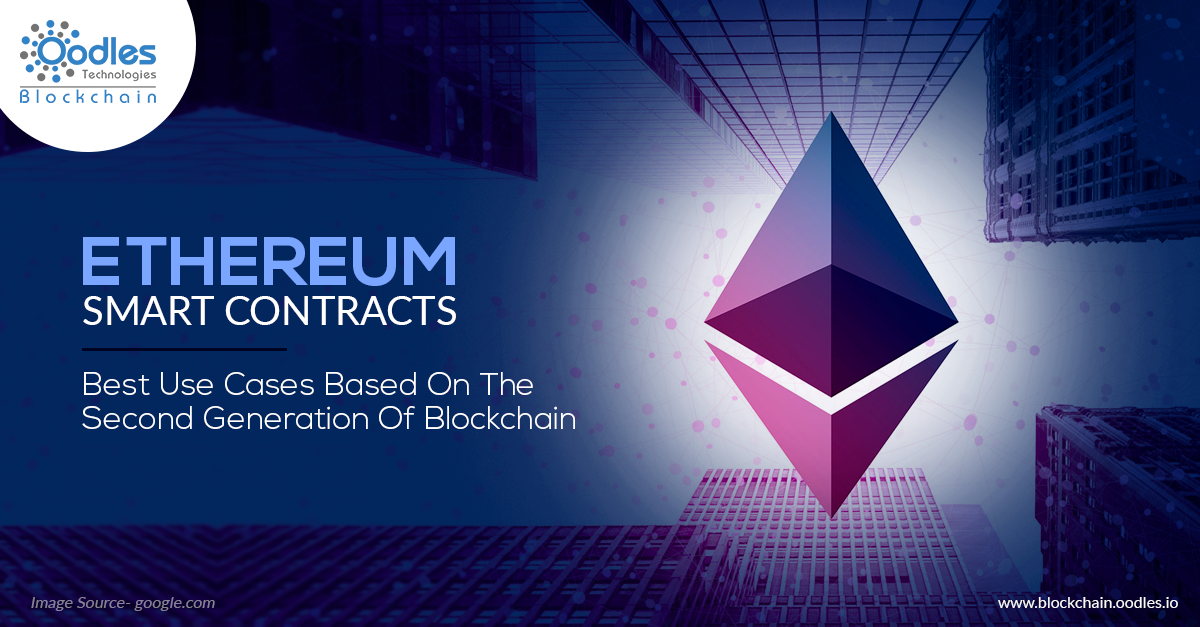-
Ethereum is known as the second generation of the blockchain technology. The first generation is Bitcoin, though it has restrained scripting abilities. And thus, to develop Smart Contracts that are deployable on the Ethereum blockchain is not possible on the Bitcoin blockchain. That's why Vitalik Buterin, the father of Ethereum, visioned a blockchain like Ethereum. The Ethereum blockchain contains advanced scripting abilities. For instance, Turing completeness along with smart contracts is one of its unique features. Due to the advanced scripting abilities of the Ethereum smart contracts (blockchain) solutions, many unforeseen use cases of Ethereum smart contracts are imaginable in today's world.
Read on to know some of the best use cases of Ethereum Smart Contracts:
1) Banking & Financial Services Contracts
Ethereum Smart Contracts have found many smart use cases in the financial and banking industry. Smart Contracts can become applicable to various areas, such as in national bonds, mortgages, insurance claims, payments, settlements, etc. For instance, let us suppose that a person is paying EMIs for an asset and fails to pay an 'x' number of EMIs consecutively without providing any prior notice to the bank. In this case, instead of implying a foreclosure process, a complete-length smart contract can be written for enforcing the terms and conditions. Or let us imagine, a government bond is about to mature. If written and maintained with Smart Contracts, it will disburse the maturity funds to the bearer upon maturity. Doesn't it sound like an incredible application of smart contracts?
2) ICOs or DAICOs:
Ethereum Smart Contracts can help make the complete process of ICOs (Initial Coin Offering) or token sales more transparent, effective, and democratic. Not long ago, Vitalik Buterin, the founder of Ethereum, presented a DAICO model. It's a hybrid model of a DAO and ICO. In a DAICO, the development team that's planning to launch an ICO campaign executes a DAICO smart contract on the Ethereum blockchain along with a DAICO variable known as 'tap'. Although it's quite different when compared to the old ICO model, it also commences in 'Contribution mode' just like the old ICO contracts and enables investors to contribute Ether according to the rules of the ICO. However, the variable in the DAICO contract, the 'tap', determines how much Ether a developer can withdraw from the contract per second. The tap limit gets monitored and governed by the DAICO contributors. It, eventually, allows contributors to keep a check on the developers as they aren't allowed to withdraw the whole contributed sum at once. Now you can see how effective and efficient the ICO or token sale model can become using advanced Ethereum smart contracts.
3) Prediction Markets
The prediction market is another insightful addition to the use cases of Ethereum smart contracts. Also, there are a few platforms developed on the Ethereum blockchain. They decided to implement the use case of prediction markets, such as Gnosis and Augur. The idea of a prediction market can be used for the places where you want to predict the outcome of an ongoing football match, an Election campaign in a country, price discovery points of auctions, the probability of Elon Musk succeeding in colonizing Mars, etc. In such scenarios, the participants will be provided with incentives when making predictions. When some of them predict accurately, they'll be further rewarded using trustless smart contracts deployed on the Ethereum blockchain. Not only these predictions can be used in gambling and betting but also for knowing whether a should go with the launch of a particular product or not and thus, making the entire process cheap and rewarding.
4) Replacing Escrow
Smart Contracts can come in use in places where you have escrow services and middlemen. Because now it's possible to replace them with smart contracts. However, smart contracts, in this scenario, need to be extremely agile and proficient. They need to be thoroughly equipped with all scenarios and conditions. Indeed, should be well-tested. One instance of it can be that you develop a smart contract-based job portal like Upwork where Smart Contracts will act like the escrow rather than a centralized platform that asks for commissions on each successful work done through them.

Our Offices
INDIA
Emaar Digital Greens, Sector 61,
Gurugram, Haryana
122011.
Welldone Tech Park,
Sector 48, Sohna road,
Gurugram, Haryana
122018.














